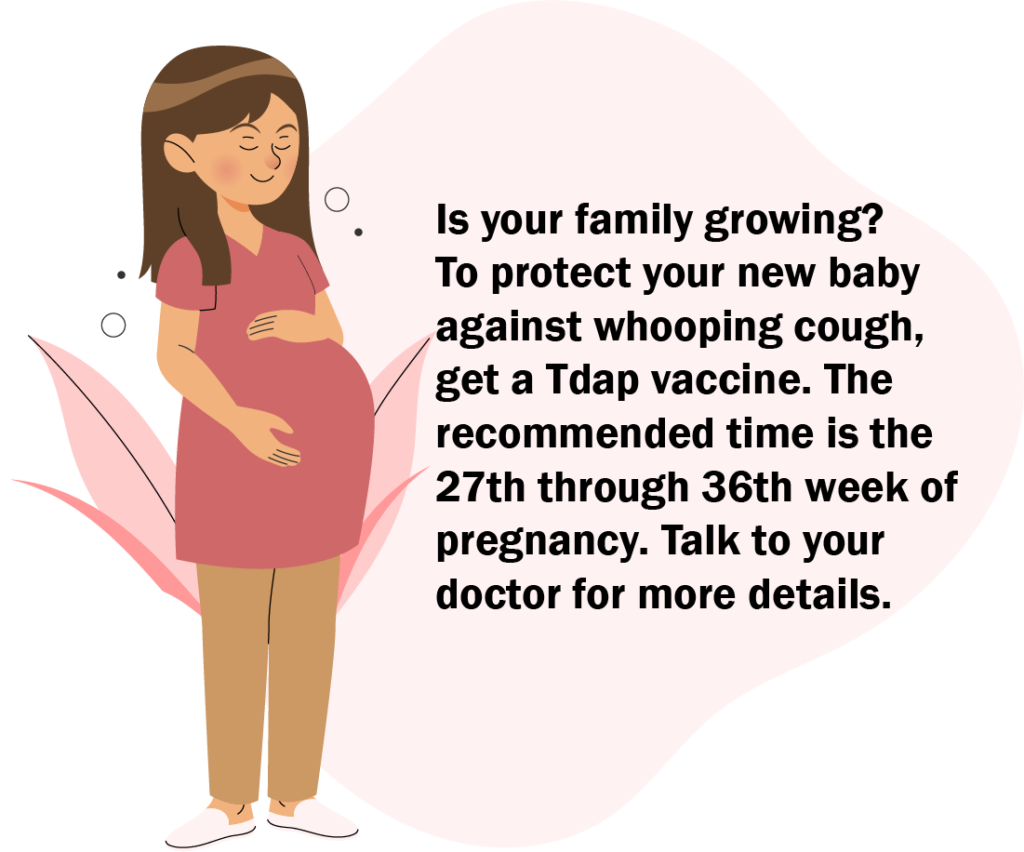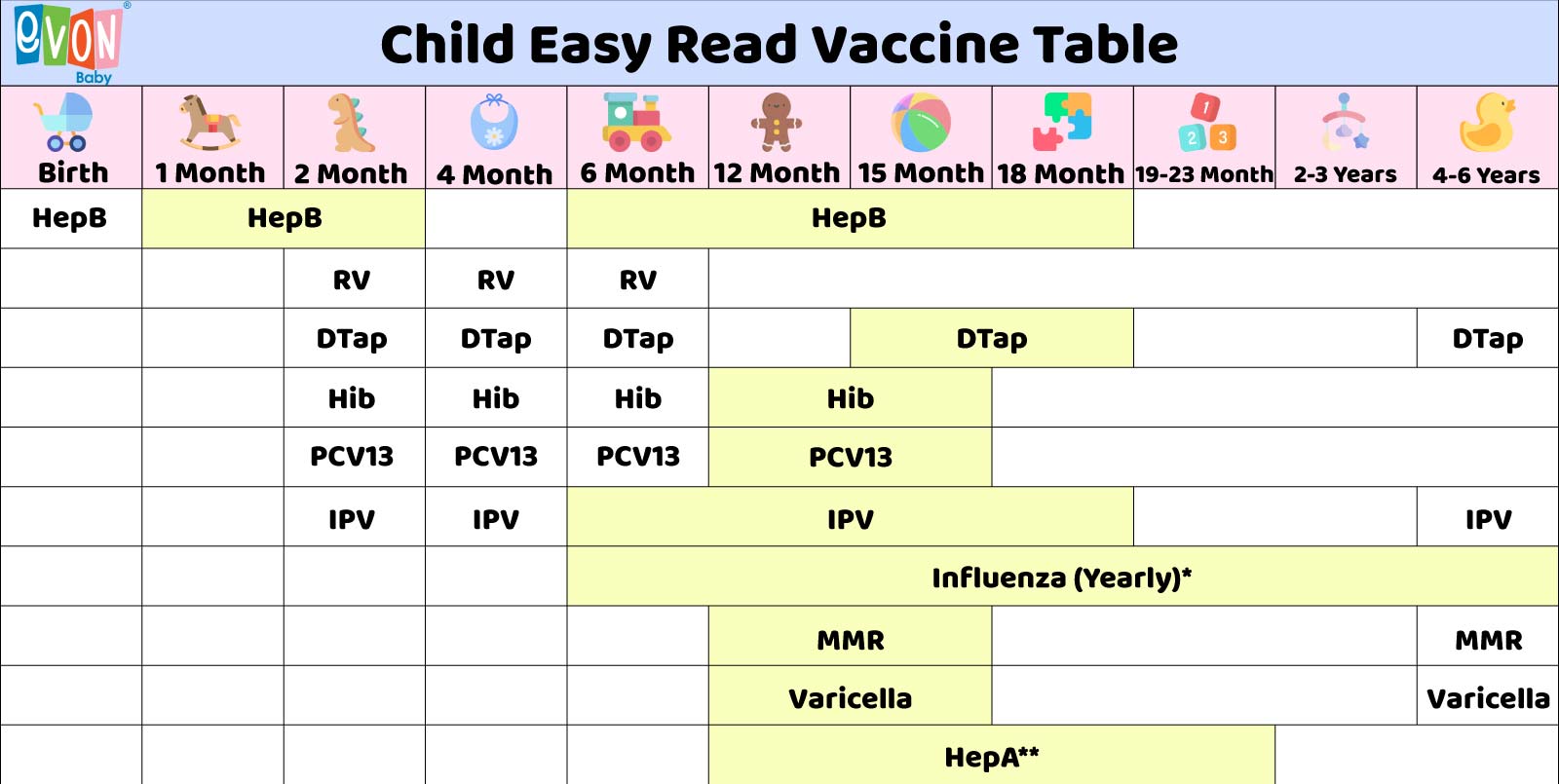2021 Baby Vaccine Schedule

2021 Recommended Vaccinations for Infants and Children (birth through 6 years)

Vaccination is one of the best ways parents can protect infants, children, and teens from 16 potentially harmful diseases that can be very serious, may require hospitalization, or even be deadly.
And immunizations are not just for children. Protection from some childhood vaccines can wear off over time. Adults may also be at risk for vaccine-preventable disease due to age, job, lifestyle, travel, or health conditions.
Note: If your child misses a shot, you don’t need to start over. Just go back to your child’s doctor for the next shot. Talk with your child’s doctor if you have questions about vaccines.
Footnotes
*Two doses given at least four weeks apart are recommended for children age 6 months through 8 years of age who are getting an influenza (flu) vaccine for the first time and for some other children in this age group.
**Two doses of HepA vaccine are needed for lasting protection. The first dose of HepA vaccine should be given between 12 months and 23 months of age. The second dose should be given 6 months after the first dose. All children and adolescents over 24 months of age who have not been vaccinated should also receive 2 doses of HepA vaccine.
Vaccine-Preventable Diseases and the Vaccines that Prevent Them
| Disease | Vaccine | Disease spread by | Disease symptoms | Disease complications |
|---|---|---|---|---|
| Chickenpox | Varicella vaccine protects against chickenpox. | Air, direct contact | Rash, tiredness, headache, fever | Infected blisters, bleeding disorders, encephalitis (brain swelling), pneumonia (infection in the lungs) |
| Diphtheria | DTaP* vaccine protects against diphtheria. | Air, direct contact | Sore throat, mild fever, weakness, swollen glands in neck | Swelling of the heart muscle, heart failure, coma, paralysis, death |
| Hib | Hib vaccine protects against Haemophilus influenzae type b. | Air, direct contact | May be no symptoms unless bacteria enter the blood | Meningitis (infection of the covering around the brain and spinal cord), intellectual disability, epiglottitis (life-threatening infection that can block the windpipe and lead to serious breathing problems), pneumonia (infection in the lungs), death |
| Hepatitis A | HepA vaccine protects against hepatitis A. | Direct contact, contaminated food or water | May be no symptoms, fever, stomach pain, loss of appetite, fatigue, vomiting, jaundice (yellowing of skin and eyes), dark urine | Liver failure, arthralgia (joint pain), kidney, pancreatic, and blood disorders |
| Hepatitis B | HepB vaccine protects against hepatitis B. | Contact with blood or body fluids | May be no symptoms, fever, headache, weakness, vomiting, jaundice (yellowing of skin and eyes), joint pain | Chronic liver infection, liver failure, liver cancer |
| Influenza (Flu) | Flu vaccine protects against influenza. | Air, direct contact | Fever, muscle pain, sore throat, cough, extreme fatigue | Pneumonia (infection in the lungs) |
| Measles | MMR** vaccine protects against measles. | Air, direct contact | Rash, fever, cough, runny nose, pink eye | Encephalitis (brain swelling), pneumonia (infection in the lungs), death |
| Mumps | MMR**vaccine protects against mumps. | Air, direct contact | Swollen salivary glands (under the jaw), fever, headache, tiredness, muscle pain | Meningitis (infection of the covering around the brain and spinal cord), encephalitis (brain swelling), inflammation of testicles or ovaries, deafness |
| Pertussis | DTaP* vaccine protects against pertussis (whooping cough). | Air, direct contact | Severe cough, runny nose, apnea (a pause in breathing in infants) | Pneumonia (infection in the lungs), death |
| Polio | IPV vaccine protects against polio. | Air, direct contact, through the mouth | May be no symptoms, sore throat, fever, nausea, headache | Paralysis, death |
| Pneumococcal | PCV13 vaccine protects against pneumococcus. | Air, direct contact | May be no symptoms, pneumonia (infection in the lungs) | Bacteremia (blood infection), meningitis (infection of the covering around the brain and spinal cord), death |
| Rotavirus | RV vaccine protects against rotavirus. | Through the mouth | Diarrhea, fever, vomiting | Severe diarrhea, dehydration |
| Rubella | MMR** vaccine protects against rubella. | Air, direct contact | Sometimes rash, fever, swollen lymph nodes | Very serious in pregnant women—can lead to miscarriage, stillbirth, premature delivery, birth defects |
| Tetanus | DTaP* vaccine protects against tetanus. | Exposure through cuts in skin | Stiffness in neck and abdominal muscles, difficulty swallowing, muscle spasms, fever | Broken bones, breathing difficulty, death |
* DTaP combines protection against diphtheria, tetanus, and pertussis.
** MMR combines protection against measles, mumps, and rubella.
This schedule is recommended by the Advisory Committee on Immunization Practices (ACIP) and approved by the Centers for Disease Control and Prevention (CDC), American Academy of Pediatrics (AAP), and American Academy of Family Physicians (AAFP).

